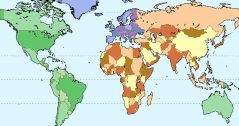|
|
| COMPANIES |
Discover the reality of companies and brands!
|
| TRANSNATIONALE.ORG |
| Free and independant information on large corporations |
Home >PhilippinesOffshore finance Economy, tax incentives & labor conditionsThe Export processing zones are known for low wages, punishing working hours, breakneck production rates and strong repression. Overtime is the norm, and the factory gates are often locked to prevent workers leaving before their tasks are finished or their quotas filled. Trade union activity is strongly discouraged in the EPZs. The officials who govern the zones try to block organising by maintaining a "union free, strike free" policy. There have been many cases where workers who form or join a union, or take union action, have been dismissed. Employers have refused to recognise unions, refused to negotiate, or have set up their own "sweetheart" unions. The Department of Labor has proved unable or unwilling to enforce labour legislation in the EPZs. There were a number of cases in 2004-2006 where companies closed as soon as unions were organised, or when unions formally proposed collective bargaining demands to the company. The closures were clearly an attempt to thwart union organisation and collective bargaining, because in many cases, the same company would then reopen under a new name, but with the same owner/s.
At least 33 unionists were killed in an orgy of extrajudicial violence. The prevailing atmosphere of impunity further undermined any meaningful enforcement of the labour law, with many other trade unionists facing intimidation, abduction and even torture.
It remains common practice for employers to file administrative and criminal charges against union leaders and activists. This involves, for example, filing charges of theft of company assets and products; forgery of union registration documents; fraudulent union documents; and libel cases for making labour claims against the company. Among the tactics seen frequently during the year to frustrate the formation of unions were: physical isolation of union officers and activists and physical prevention of union certification elections.
Four export processing zones: Bataan, Cavite, Baguio City and Mactan Island in the Visayas. EPZ incentives include tax- and duty-free importation of capital equipment, raw materials and spare parts. There are about 250 registered companies in the EPZs, most of which are involved in the manufacture and export of electronics, garments, rubber products, fabricated metals, plastics, electrical machinery, transport equipment and industrial chemicals. Export and free trade companies benefit from a tax holiday of 3-6 years on corporate income, extendible to not more than 3 years
Minimum wage noted (US$/day)
2008 1.85 US$/day at/for Dole Food Company Inc. |
translate this page in arabic chinese dutch german japanese korean russian
Legal notice © T&C 1999-2010
| CONTRIBUTIONS |

